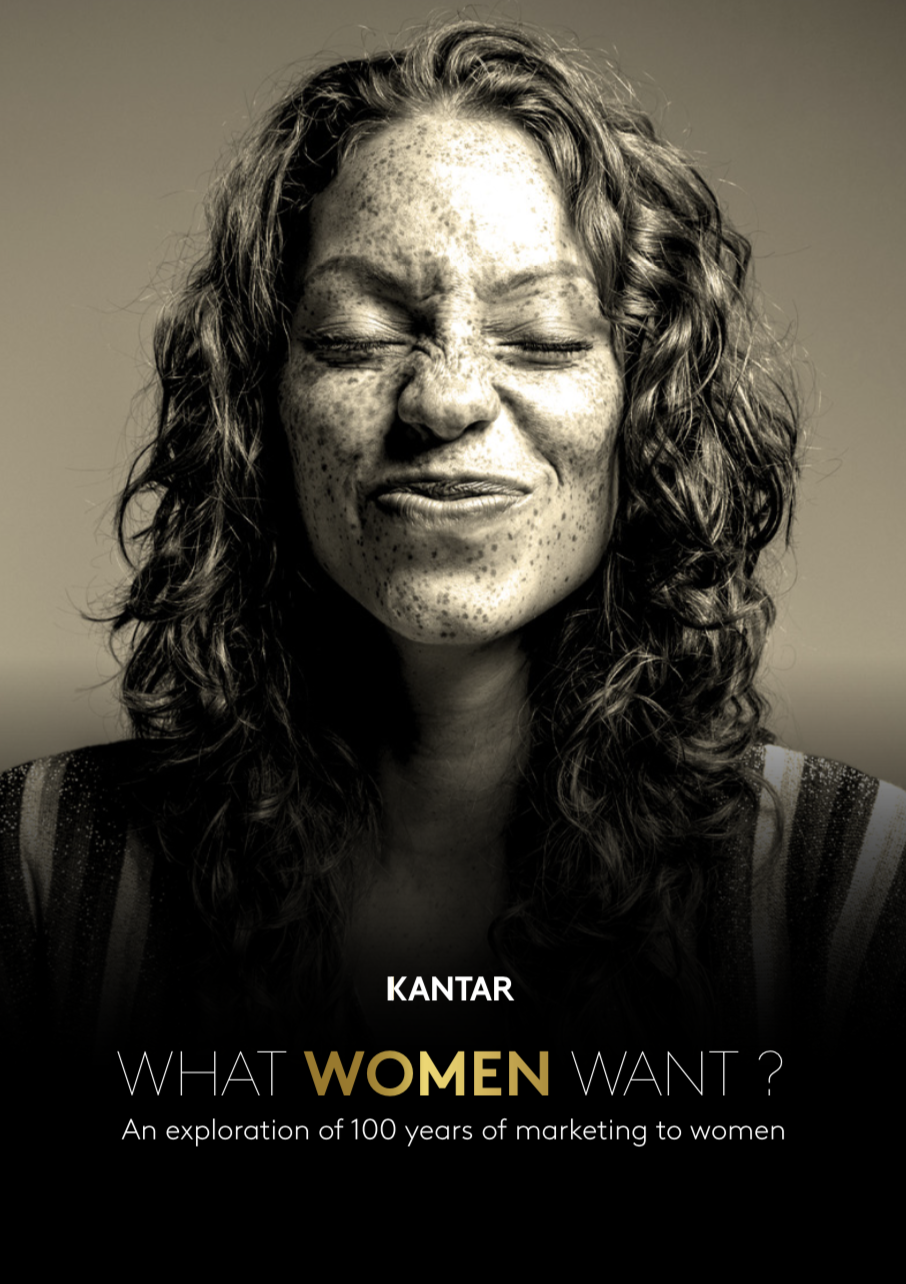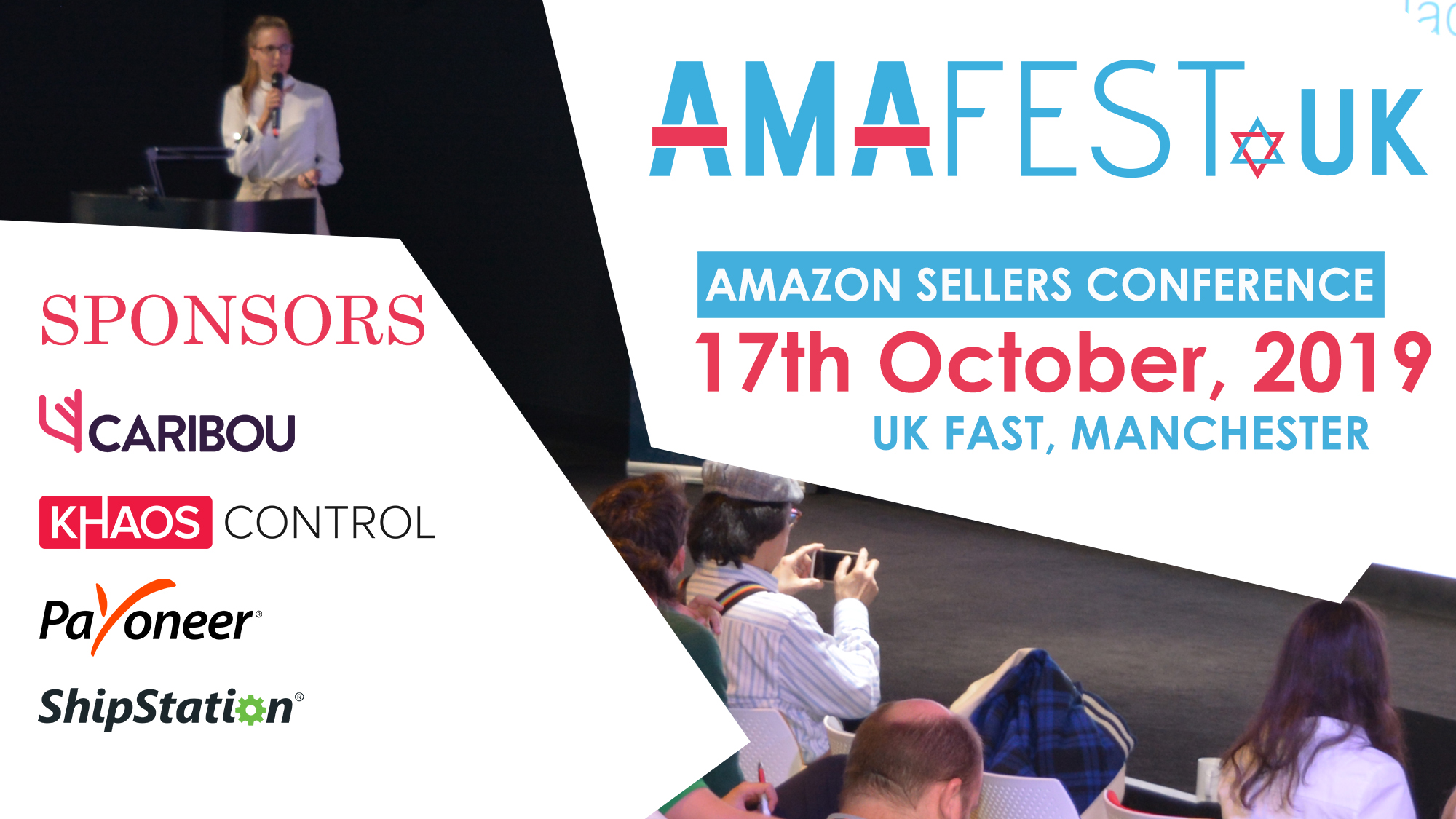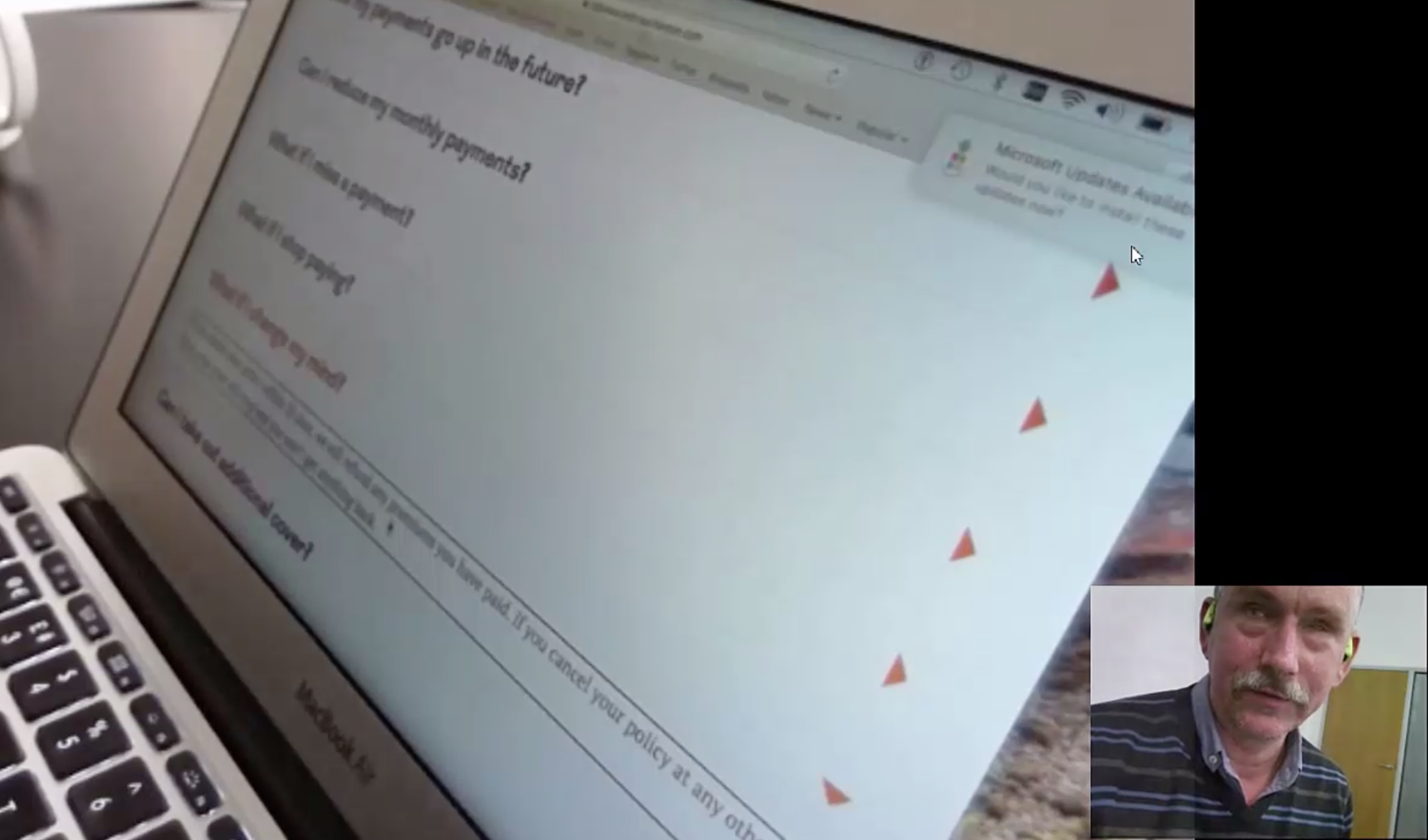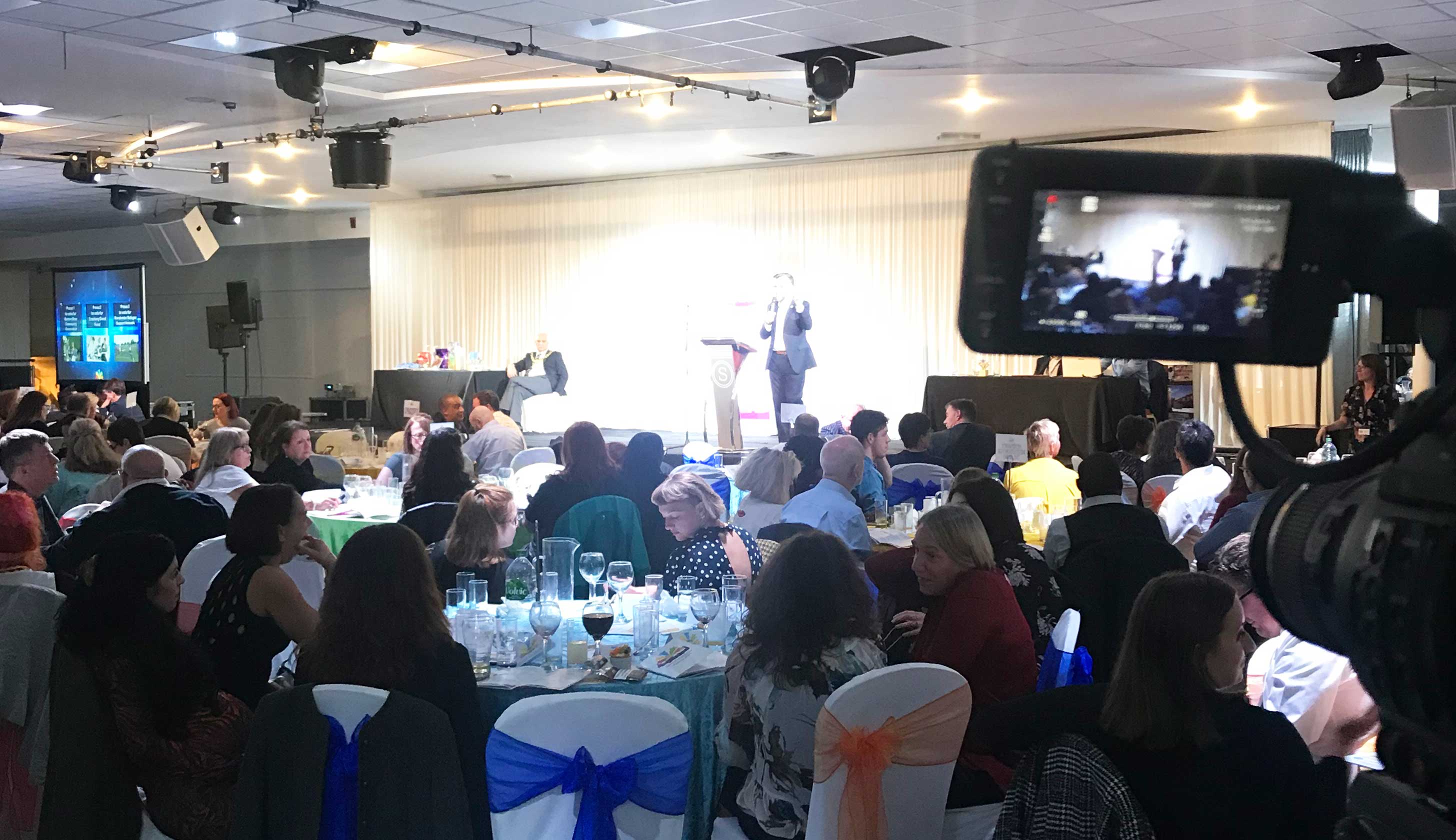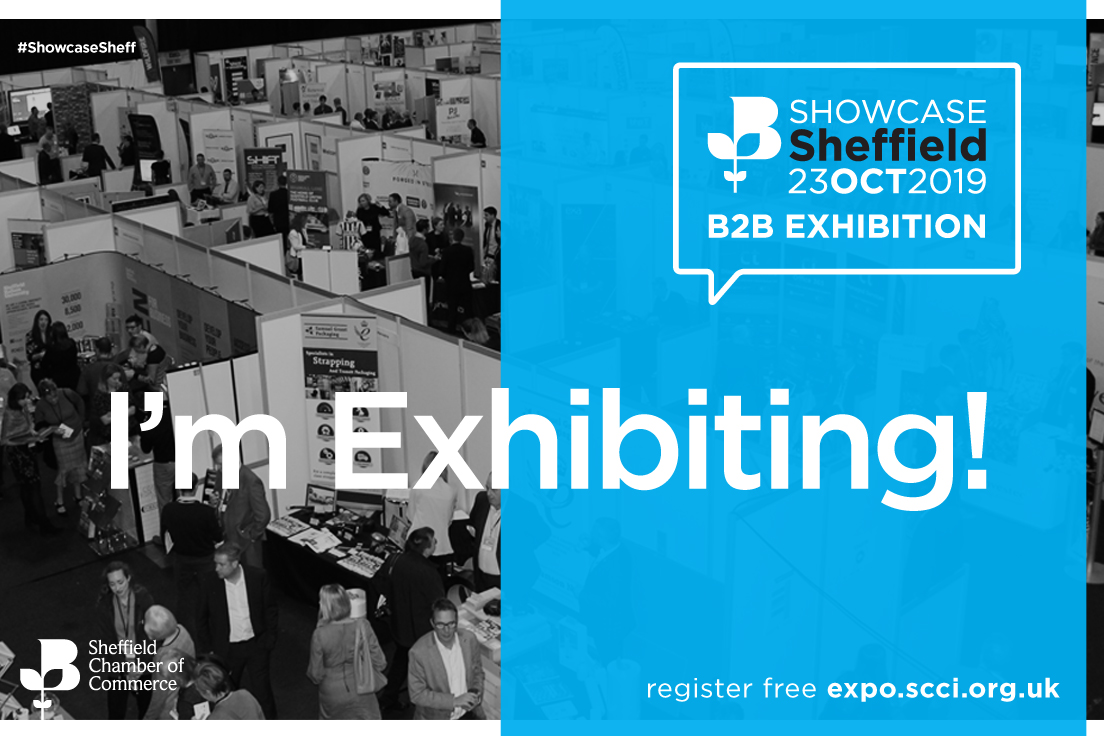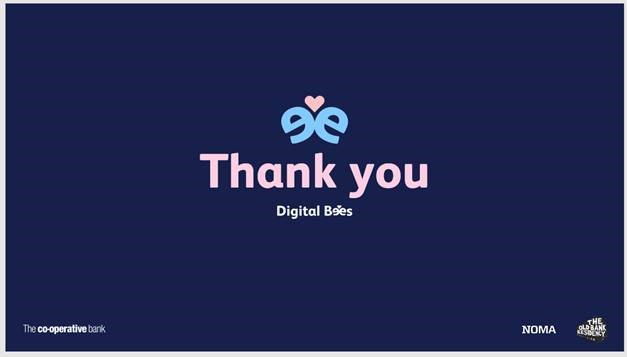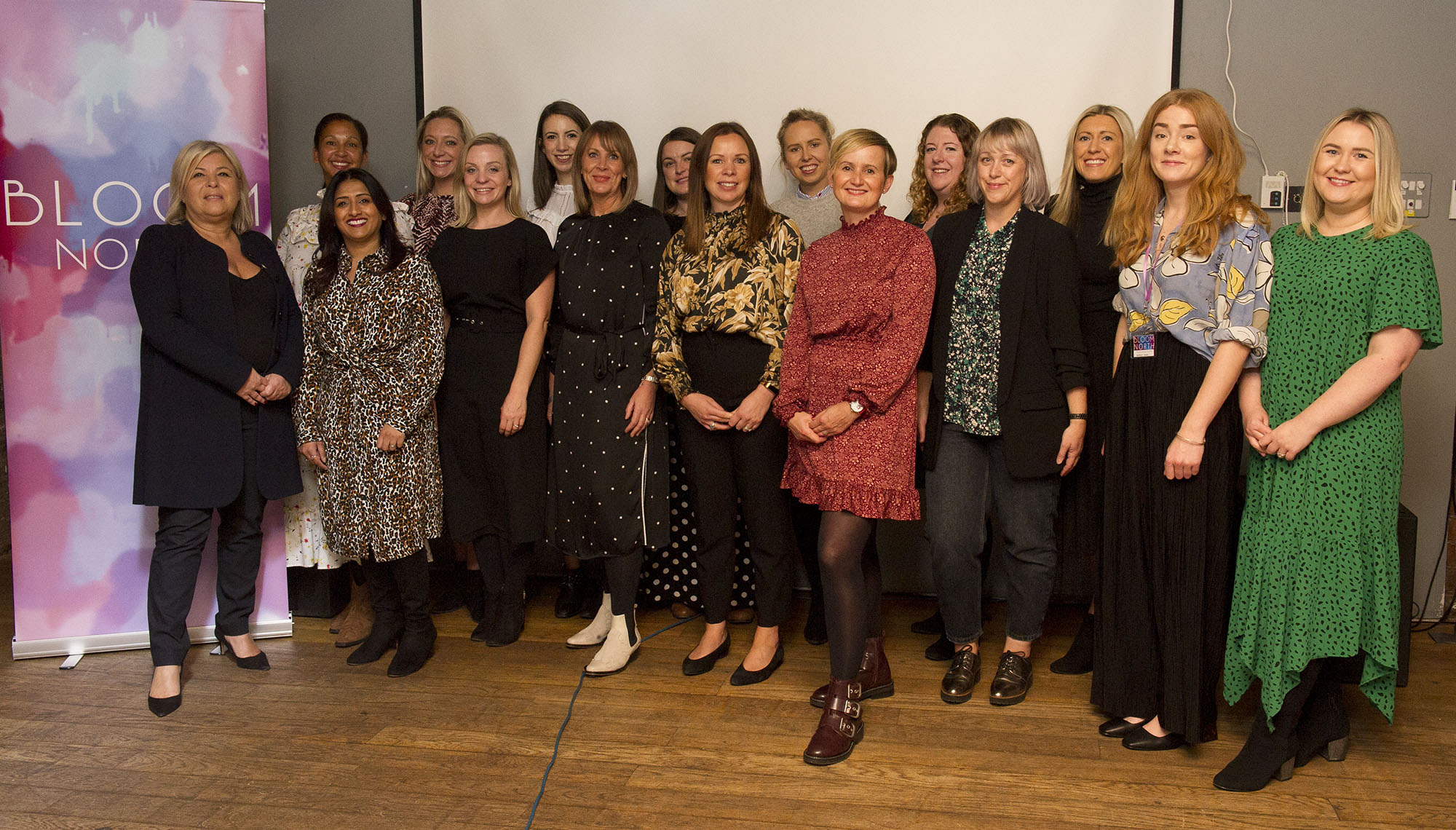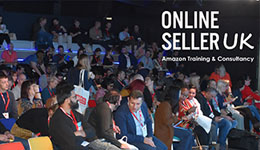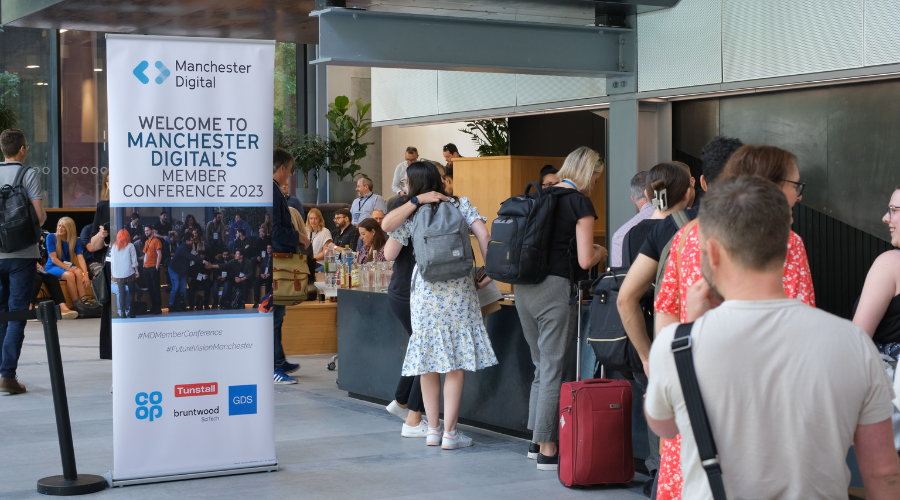
AI and the future of work, the power of diversity, decarbonising the web and funding the North were just some of the topics discussed as Manchester Digital hosted its annual Member Conference on Thursday 22nd June.
Guests from across the Manchester Digital community gathered at No.1 Circle Square as we explored this year’s theme, “FutureVision Manchester: Charting the Path to a Better Tomorrow”.

With an impressive lineup of presentations and panels from industry leaders, technologists and innovators, the afternoon offered valuable insights into the digital landscape and its potential to shape Manchester's future.
This year’s Conference was sponsored by Tunstall Healthcare, Government Digital Service, Co-op and Bruntwood SciTech.

Following a welcome address from Manchester Digital managing director Katie Gallagher, guests were able to choose between two streams of presentations from Manchester Digital members.
Kicking things off in Studio 1 were BAE Systems Digital Intelligence, with a personal account of one employee’s journey into tech as a neurodiverse female. With just 22% of autistic individuals in work, and less than 26% of tech roles taken by women, the number of autistic women in tech is very small.
As a sector, we need to look at representation on all levels. Diversity in tech leads to increased innovation, better understanding of customers, a wider and more varied talent pool, and better retention rates.
In Studio 2, Richard Fallon from Naimuri, discussed “The Future of Manchester…what if?”, looking into how and what makes a world renowned tech hub, such as Silicon Valley, Boston or Tel Aviv. He explained that it had to be a combination of numerous factors, such as space and facilities; investment; people and talent; market and good universities. Richard went on to say that he would love Manchester to become known for being the main UK tech hub, in the same way that it used to be known for its music scene. “If you said you lived in Silicon Valley, people would assume you worked in the tech industry - that’s what I would like to see for Manchester.”

Our next session in Studio 1 was delivered by Rick Butterfield, Development Team Lead at Nexer Digital and Umbraco MVP who was here to discuss “Decarbonising the planet” and how tech can contribute to a greener future.
Rick explained just how big a deal sustainability is for Nexer, having launched their sustainability strategy in 2022. With the carbon footprint of our gadgets, the internet, and the systems supporting them accounting for 3.7% of all global greenhouse emissions, is it time we considered our businesses’ own sustainability journeys?
“There are things we can all be doing, such as offering dark mode on our website, keeping track of our carbon usage, and building carbon aware websites. Starting talking to your clients and vendors about what they are doing to reduce carbon footprint and always keep sustainability in mind.”
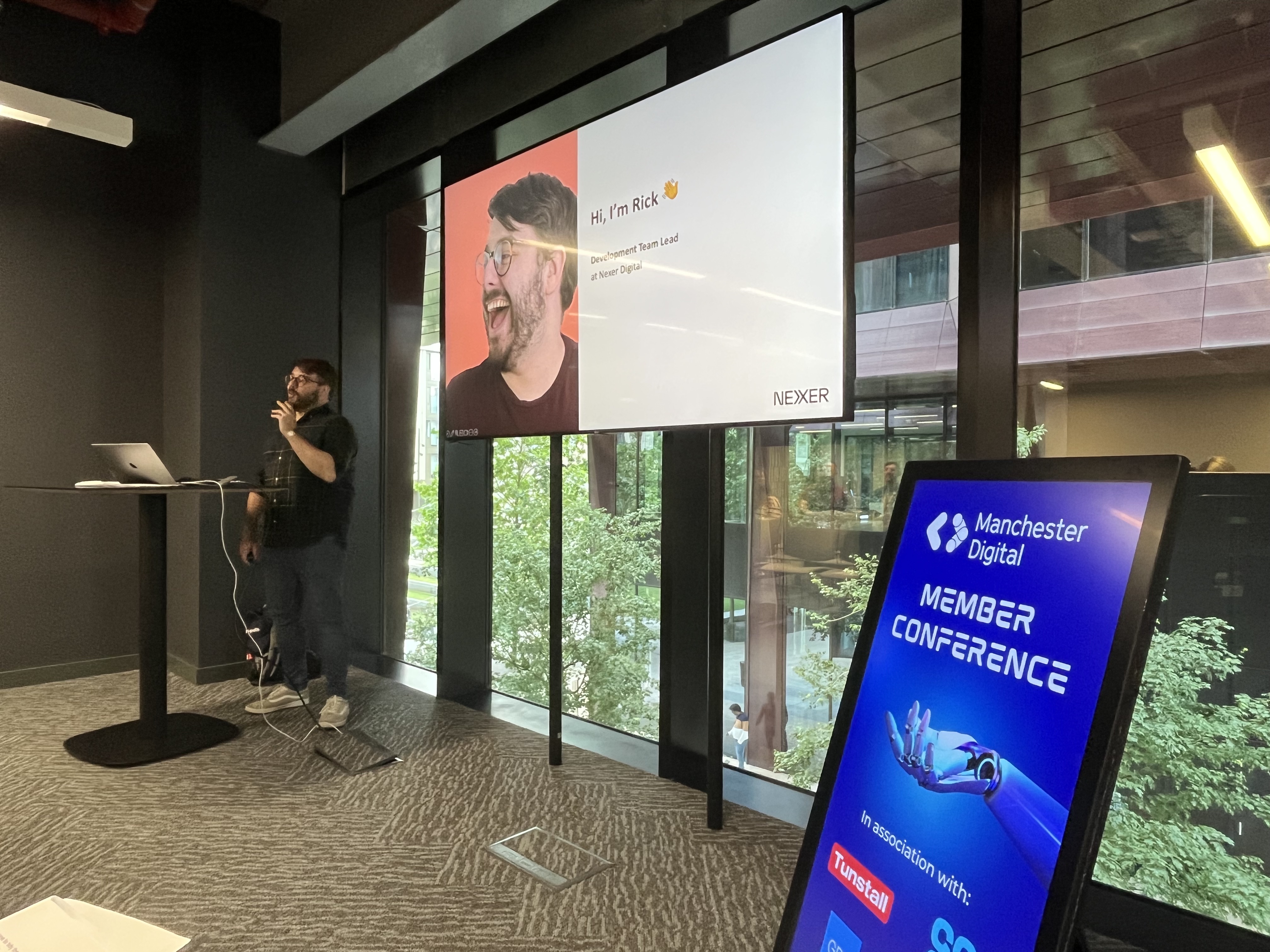
In Studio 2, Mike Spain from Atkins, talked us through his journey into setting up NeuroCyber, which is an organisation which aims to understand the barriers for neurodivergent people in cyber security and the wider tech industry. This stemmed from his son being diagnosed with autism at the age of three.
Mike’s research found that only 16% of autistic adults were in full-time employment and the figures were actually getting worse. Mike has undertaken significant research into how businesses can help people who are neurodivergent, not just in terms of recruitment but in helping them progress within the company.
He says that it’s not enough just to conclude that we must do better, there actually has to be tangible recommendations. You can find the full report findings on the NeuroCyber website.
Next up in Studio 1 was Matt Squire, Chief Technology Officer at Fuzzy Labs, with a talk on the hottest of hot topics: Large Language Models and why open source is the future.
During the session, Matt explained how open source is the future of generative AI, before finishing with a live demonstration of a LLM.
“If you want to use a Large Language Model in your own application then you have two options, pay the OpenAI API or run your own model.
“Open source allows you to
- Fine tune the model for your own purposes
- Run the model on your own infrastructure
- Own the whole thing, end-to-end”
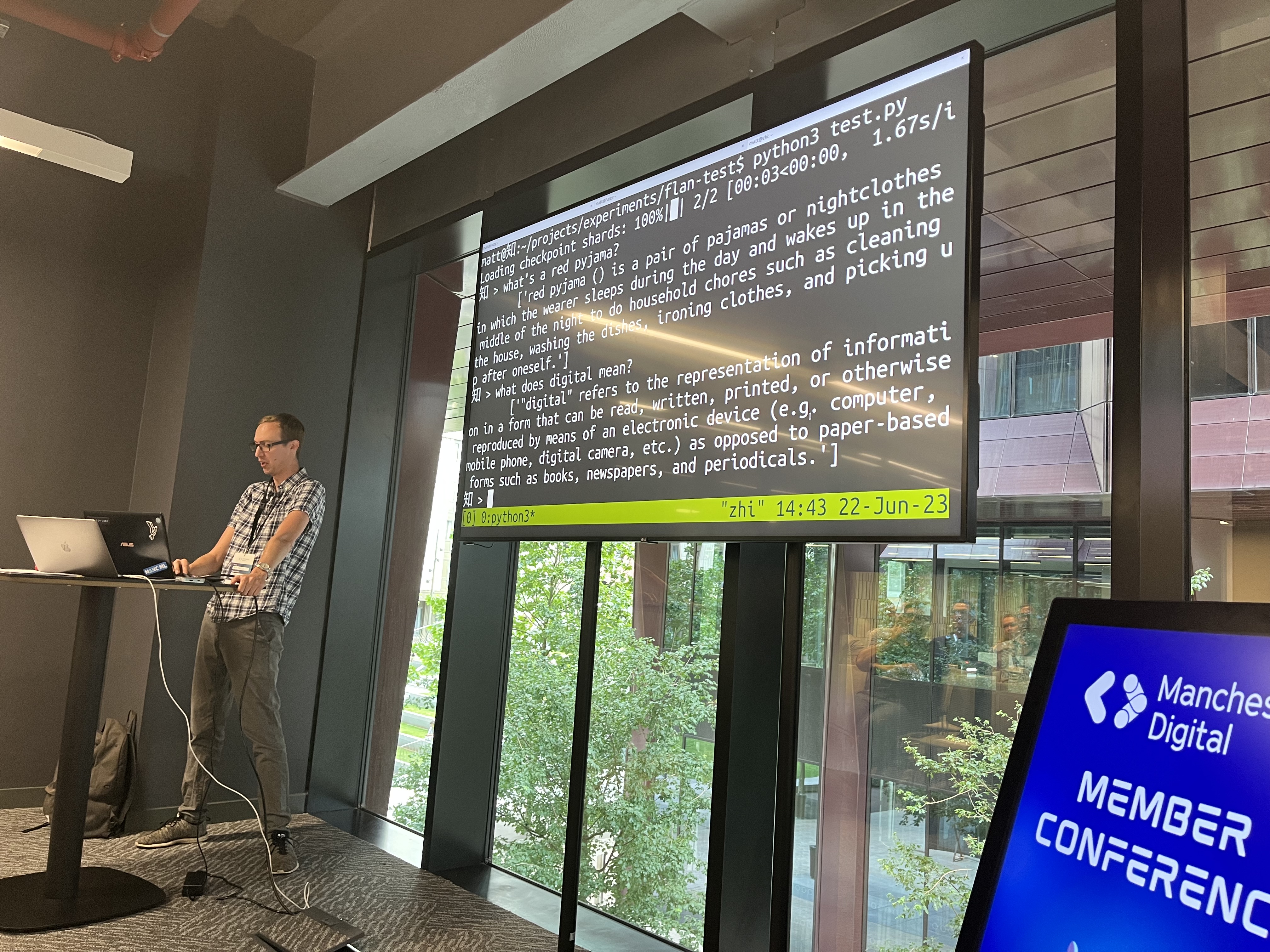
The last session in Studio 2 before the networking break saw Dave Foreman, co-founder and MD at Praetura Ventures, give some solid advice to start-ups on how to pitch to venture capital businesses. His overall advice was to:
- Simplify
- Tell your story
- And stand out
He went on to explain that initially you have to give just enough information and explain what your startup does, or what problem it solves, as your goal is simply to get a meeting. You don’t need to give details of how the business is set up or financials, for example. And in the first meeting, your aim is simply to get a second meeting - and that is when you can start going into some more detail within the business.
To give context, Dave said “We see 200 companies a month, so you really do need to stand out. Tell your founder story - what is the background into when or where you realised that people needed this product or service.
“Also be honest about the risks. If you say there aren’t any risks, we just won’t believe you.”
Following a short break for networking and ice-cream, guests reconvened for the afternoon’s panel, “Navigating the Future: AI and Human Workforce Integration”.
The session was chaired by Manchester Digital MD Katie Gallagher, who was joined by Simon Thompson (Head of Data Science at GFT), Juliette Dennett (Consultant at Dale Carnegie North), Mike Skelton (Deputy Director, Publishing and Infrastructure at Government Digital Service) and Alex Meehan (Data Science Product Lead at Co-op).

The panel discussed the latest developments around AI technology, the careful steps businesses should take in incorporating them and the implications it could have for our workforce, with much of the conversation unsurprisingly focusing around the seismic waves felt across the business world since ChatGPT launched last year.
Some of the key points made by our panel included:
- Mike Skelton: “We need to consider how we can best utilise AI in a practical, usable way whilst taking things such as bias, sustainability and the workforce in mind. We can reduce some of the burden of work, but It’s up to us as technologists to use the evidence and problem-solve in an ethical way.”
- Simon Thompson: “Caution is warranted around AI - when ChatGPT came out I was gobsmacked and the last 6 months has needed a lot of work to understand what these behaviours are. The surprise is there’s more to language than we thought. ChatGPT is simply regurgitating data - remember you are looking at a very sophisticated parrot.”
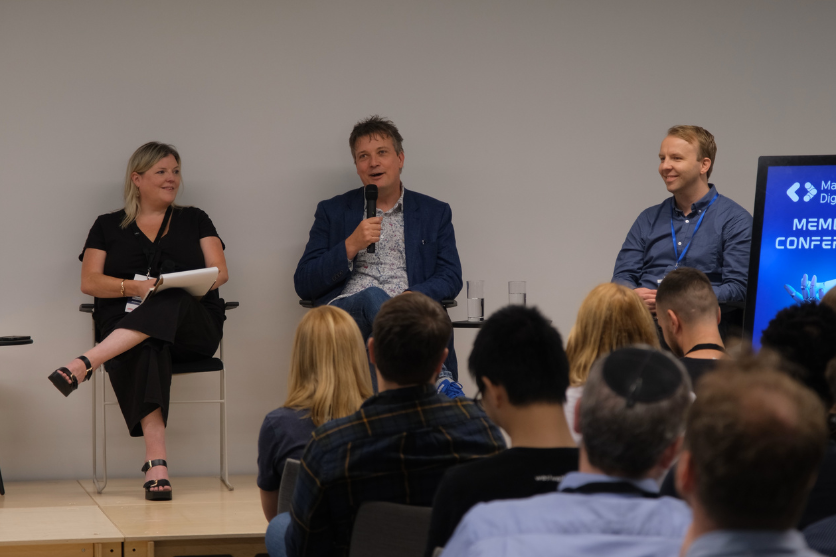
- Juliette Denette: “As the technology matures, strong leadership will be very important. Attitudes towards AI are three times more positive within organisations if certain conditions already exist, the main one being trust of leaders.”
- Alex Meehan: “The ethics behind AI is top of mind at the Co-op and we already have some processes in place as AI isn’t new. There is also a counter side to all this though, where AI helps to reduce risk and reinforces an organisation's ethics. There are real opportunities for businesses as well as the governance around managing risk.”

- Simon Thompson: “Some dangers to be mindful of when it comes to AI include twinning attacks and prompt injections. You’ve got to be very careful what you’re giving these models the keys to. It reminds me somewhat of self driving cars - there has been a lot of accidents and they haven’t been rolled out in the way it was projected they would. Technology is very difficult to anticipate and we need to bear that in mind when introducing AI to our organisations.”
- Juliette Dennett: “There are four key areas for organisations to consider when introducing AI to their organisations:
- Human rights
- Robustness of systems
- Transparency and explainability
- Accountability
- Simon Thompson: “The likes of ChatGPT will have an important role to play when it comes to digital inclusion, and there are opportunities for Large Language Models to help people participate. As a society though it’ll be important for us to develop a set of behaviours around this sort of thing.”
To conclude the session, each of our panellists gave a takeaway for businesses considering adopting AI into their organisations:
- Alex Meehan: “Embrace it, but think it through, take your time and be cautious.”
- Juliette Dennett: “Keep involving the humans in the workforce during the implementation of AI, and get them involved in the vetting of outcomes. There is a unique skill set that a human workforce brings to augment AI, and these soft skills can’t be replicated.
- Simon Thompson: “There’s obvious value and opportunity around AI - these are powerful new tools that could really change our economy and help us manage society if they are wielded in the right way. There’s lots of challenges we face as a world, so this could be extremely useful and powerful. But if we put these tools in the hands of people who are driven by profit or by politics then it could end very badly despite what they promise.”
- Mike Skelton: “Take the time to learn how these things work, understand the implications of the types of data you use and how these impact outputs. Really think about how you can use this sort of technology.”

Following the panel, our final presentation of the afternoon was delivered by Ian Legate, Director of Product Management and Manchester Site Leader at Bosch, who joined us to discuss “Connected Mobility for the Software Defined Vehicle”.
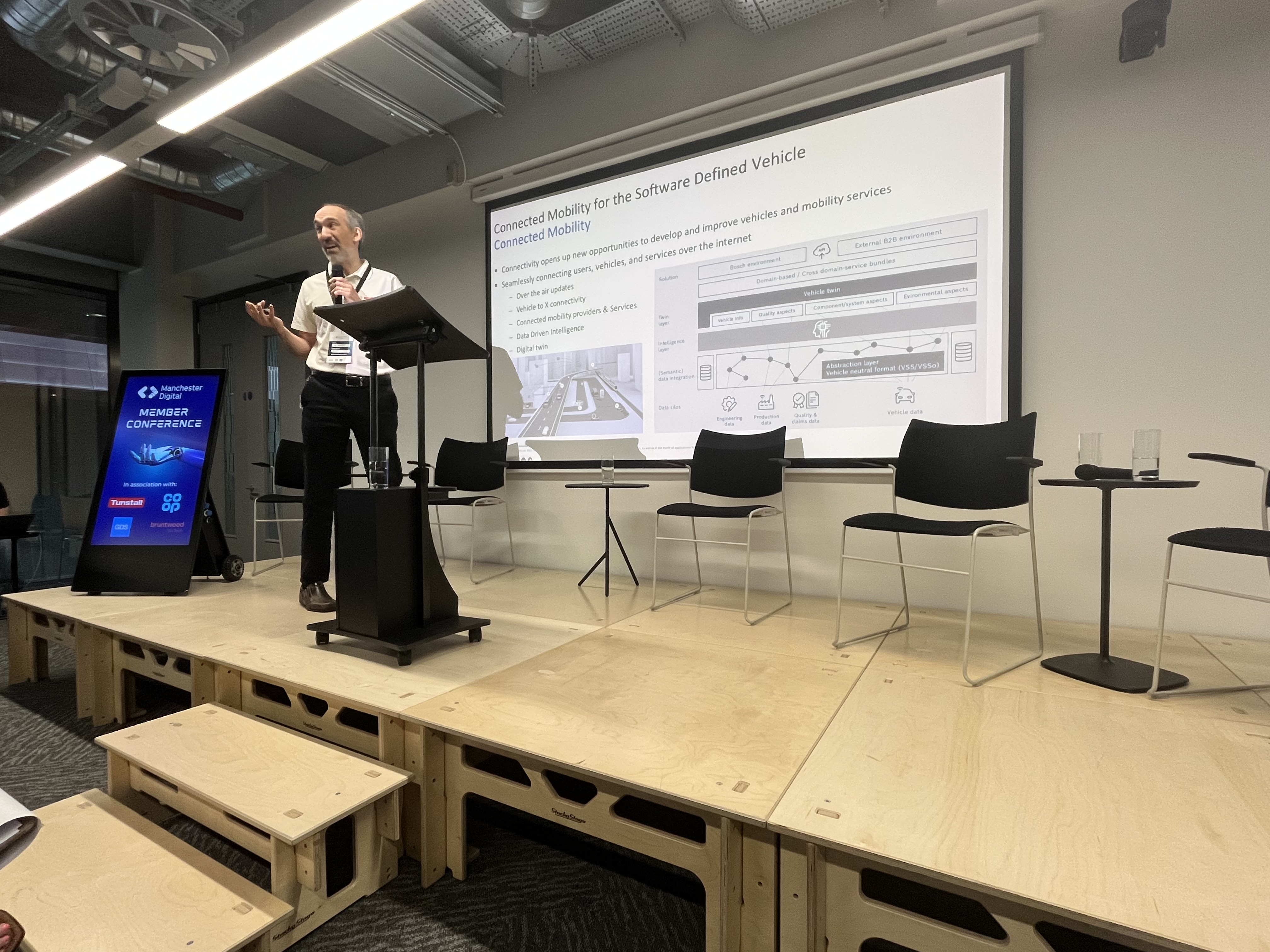
Ian explained the importance of Manchester for Bosch following their move to the city centre in 2021 and how they are committed to excellence in the mobility sector, before talking about the ways in which connectivity opens up new opportunities to develop and improve vehicles and mobility services.
Users, vehicles and services will be seamlessly connected over the internet as vehicles are fully integrated into our digital lives, whilst also allowing for new business opportunities and collaborations.
Software Defined Vehicles will enable continuous optimisation within the limits of their hardware, as a DevOps approach to vehicle operation is rolled out.
“Today a car is a mobile phone on wheels, but tomorrow it will be a data centre on wheels.”
To conclude a fantastic afternoon and before the evening’s Summer Social event, managing director Katie Gallagher and board member and secretary Shaun Fensom discussed AGM matters with members.
About our Sponsors
Tunstall Healthcare
“We had a fantastic time at the Manchester Digital Members Conference. It was an afternoon filled with inspiration, networking, and a sneak peek into some incredible 'FutureVision'. At Tunstall, We’re leading the charge to harness the power of technology to enhance the quality of life for millions of people worldwide. Pretty exciting stuff, right?! Find out more about what we do here.”
Gary Steen, Chief Operating Officer
Government Digital Service
"Government Digital Service is a great place to work and we're hiring in Manchester!
Everything we do is thanks to our amazing team, working hard to provide the best possible experience for all our users, both internal and external to the government. To find out more about our work, read the GDS Blog or Inside GOV.UK.
If you're interested in joining the team, we're always looking for passionate and motivated people to work with us. All of our open vacancies are available to view on the Civil Service Jobs site (and we plan to recruit more roles in Manchester over the coming year, so watch this space!"
Mike Skelton, Deputy Director, Publishing and Infrastructure.
Co-op
"We wanted to take a moment to express our sincere gratitude for your presence at the recent Member Conference.
It was truly a pleasure meeting each and every one of you and experiencing such an engaging and memorable gathering. We found the event was a resounding success, thanks in large part to the enthusiasm and active participation of individuals like yourselves. The insightful discussions, valuable connections, and shared experiences made the occasion truly special. We thoroughly enjoyed the opportunity to connect and exchange ideas with all of you.
As we move forward, we eagerly anticipate future encounters and collaborations. In the meantime, if you would like to stay updated on the latest happenings at the Coop, we invite you to visit our website at Co-op: It's What We Do - Co-op.
Thank you once again for your presence and contribution to the event. We look forward to crossing paths again soon."
Gary Wardley, Head of Engineering.
Bruntwood SciTech
"We were delighted to host Manchester Digital’s Member Conference at Circle Square and hope everyone enjoyed the afternoon. If you would like to find out more about our campuses or the space we have available for businesses of all sizes, you can contact us at hello.scitech@bruntwood.co.uk."







